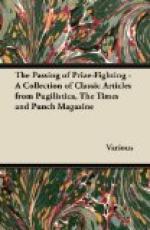* * * * *
OUR BOOKING-OFFICE.
My faithful “Co.” says he has been reading the latest novel by “JOHN STRANGE WYNTER,” called, The Other Man’s Wife, as the French would observe, “without pleasure.” As a rule he rather enjoys the works of the Author of Bootle’s Baby, and other stories of a semi-ladylike semi-military character; but the newest tale is one too many for him. The “man” is a mixture of snob and cad,—say “a snad,”—the “other man” a combination of coward and bully, the “wife” a worthy mate to both of them. The plot shows traces of hasty construction, otherwise it is difficult to account for the “man’s” intense astonishment at inheriting a title from his cousin, and the farfetched clearing up of a sensational West-End murder. My “Co.” fancies that the peerage given to the “man,” and the vendetta of the Polish Countess, both introduced rather late in Vol. II., must have been after-thoughts. However, the end of the story is both novel and entertaining. The feeble, fickle heroine is made to marry, as her second husband, the man who (as an accessory after the fact) has been the murderer of her first! And the best of the joke is—she does not know it! My “Co.” has also been much amused by a brightly-written Novel, in one volume, called A Bride from the Bush. Mr. E. W. HORNUNG evidently knows his subject well, and has caught the exact tone, or rather nasal twang of our Australian cousins. My “Co.” says that “the Bride” is a particularly pleasant young person, thanks to her youth, good heart, and beauty. However, it is questionable—taking her as a sample—whether her “people” would “pan out” quite so satisfactorily. On the whole it would seem that Australians who have “made their pile” by buying and selling land are better at a distance—say as Aborigines!
It is also the opinion of my faithful “Co.” that the Clarendon Press series of Rulers of India, has never contained a better volume than the Life of Mayo, a work recently contributed by the Editor, Sir WILLIAM WILSON HUNTER. Admirably written, the book gives in the pleasantest form imaginable, a most eventful chapter in the History of Hindostan. But more, the pages have a pathetic personal interest, as the subject of the memoir was for many years misunderstood, and consequently, misrepresented. Even the London Charivari was unfair to the great Earl, but as Sir WILLIAM hastens to say, “at his death stood first in its generous acknowledgment of his real dessert, as it had led the dropping fire of raillery three years before.” The author has, by publishing this most welcome addition to a capitally edited series, added yet another item to the long list of services he has rendered to our Empire in the distant East.
Since Miss FLORENCE WARDEN’S House on the Marsh, says the Baron, I have not read a more exciting tale than the same authoress’s Pretty Miss Smith. It should be swallowed right off at a sitting, for if your interest in it is allowed to cool during an interval, you may find it a little difficult to get up the steam to the high-pressure point necessary for the real enjoyment of a sensational story.




